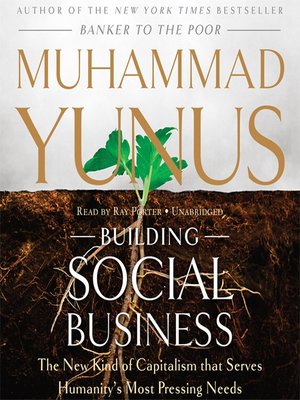Building Social Business Yunus Pdf
Muhammad Yunus, the practical visionary who pioneered microcredit and, with his Grameen Bank, won the 2006 Nobel Peace Prize, has developed a visionary new dimension for capitalism which he calls “social business.” By harnessing the energy of profit-making to the objective of fulfilling human needs, social business creates self-supporting, viable commercial enterprises that generate economic growth even as they produce goods and services that make the world a better place. In this book, Yunus shows how social business has gone from being a theory to an inspiring practice, adopted by leading corporations, entrepreneurs, and social activists across Asia, South America, Europe and the US. He demonstrates how social business transforms lives; offers practical guidance for those who want to create social businesses of their own; explains how public and corporate policies must adapt to make room for the social business model; and shows why social business holds the potential to redeem the failed promise of free-market enterprise.

New York: Public Affairs. Reviewed by Jack Becker Muhammad Yunus, winner of the 2006 Nobel Peace Prize is best known for his work with microfinancing in Bangledesh through the Grameen Bank, of which he has written several books illustrating the concept. In this more recent book, Yunus explains in depth his concept of a social business. Cara Membuka Situs Yang Diblokir Tanpa Software more. Starting from the point that a social business goal is to solve a social problem by using business methods, including the creation and sale of products or services, Yunus builds significantly on the concept throughout the book demonstrating what a social business is and is not, and laying out his vision for a global infrastructure (1).
His concept is intended to open up additional space within the capitalist market by constructing a new category of business designed to expand options to consumers, employees, and entrepreneurs (12). He thinks this concept is relevant anywhere, but mainly discusses its application to areas of absolute poverty. There are two kinds of social businesses: 1) Type I is a business that provides goods or services to advance a social goal while being owned by people who are not themselves poor or underprivileged. It generates no profits or dividends for its owners; any surplus is reinvested to finance the growth of the business and to expand the benefits it provides to society (181). Vistalink Pro Software Software.
2) A Type II social business is either actually owned by poor people... Or owned by a specially-created trust to deliver benefits to the poor (182).
This type of business is a profit-making company owned in full or at least in majority by poor people who make money through annual dividends and elect board members to control th e businesses activities. Yunus has many more examples of a Type I social business than a type II. For the first, he tells the story of a partnership with the French dairy company Danone to bring nutrient rich dairy products to rural Bangladeshi villages to tackle malnutrition. Yunus is a Bangladeshi and so brought to the partnership the local knowledge that yogurt was a traditional snack.
In 2006 Danone raised the necessary capital to build a small yogurt factory and train locals to run it. The social business plan integrated local ingredients into the products, a local artist to develop the label and relied on shops and women in the area who were borrowers with the Grameen Bank, for distribution. The business struggled for four years to become sustainable, which Yunus attributes to cultural misunderstandings at many l evels, including an assumption that women would be comfortable selling door-to-door, and that local stores would have refrigerators. When the book was written in 2010, Yunus predicted that the business would for the first time begin generating a surplus.
Th is business would become a Type II social business if ownership were transferred to the poor themselves, rather than, as it currently sits, with the Danone. As shown above a social business is d istinct from corporate social respon sibility, which relies on a business alleviating some social problem through charity or grant.
Here, Yunus comes close to a kind of profit-social good motive as articulated by Daniel Yankelovichs (2006) Stewardship Ethics, a concept that among other things, departs significantly from a charity to/for paradigm, and emphasizes the active co-production between diverse invested parties (financially and otherwise) to a social good and/or product. But Yunus still distinguishes that a social business devotes all its resources to a social cause and that while profits are allowed, the profit stays with the company and is used to expand the social benefits the company provides, namely, to the poor. It is also distinct from social entrepreneurship, which Yunus says has a social vision, but may be a non-economic initiative, a charity initiative, or a business initiative (4). Yun us emphasizes that a social business is a type of business, it is subject to market forces, and to him, thats what makes it sustainable. Yunus envisions a social business stock market forming where Type I and II social business companies will go to raise capital from individuals and investment fund managers wishing to give to a social issue. These social investors will signal the perceived value of the social business. These are non-loss investments.